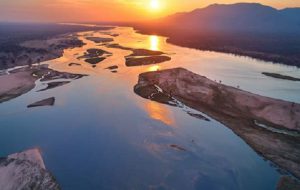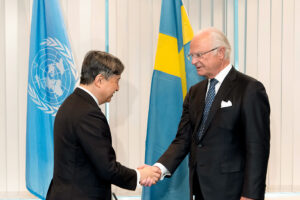SIWI mobilized to support follow-up to UN 2023 Water Conference
The UN 2023 Water Conference initiated a new era for water where it is considered as a global common good. Next, the world must embark on a mission to change the governance and economics of water at both the local and the global levels. Here, SIWI shares seven reflections on what lies ahead.
Twelve Heads of State, 80 Ministers and 6,500 non-state actors converged on New York for the UN 2023 Water Conference 22-24 March. SIWI played an active role in the conference and its year-long preparation, with 21 experts on-site to discuss, collaborate and share their expertise. While in-depth analysis of the outcomes will take a bit more time, here are seven immediate take-aways as the historic water conference draws to a close.
1. Today’s many interconnected global crises can only be solved through improved water governance.
Many discussions at the UN 2023 Water Conference, and the first report from the Global Commission on the Economics of Water, show that water governance is the key to future water security for all. A growing body of research indicates that we are facing a new magnitude of the global water crisis and that we need to profoundly transform how we use, manage and value water.
We all depend on the same water cycle and must, therefore, treat water as a global common good. In coming years, we need to transform our political and economic systems to create the right incentives and innovations for a more sustainable and just future. To achieve this and deliver on the whole 2030 Agenda for Sustainable Development, we need a systemic shift in our thinking, at both the global and the local levels.
We need to transform our political and economic systems to create the right incentives and innovations for a more sustainable and just future.
2. Water is a powerful tool for ambitious climate action
The UN conference showed how fast the climate debate is now changing, with water increasingly at the core of both adaptation and mitigation discussions. But when it comes to implementation, many obstacles remain, often due to a lack of enabling environments, such as finance, capacity, information and political will. For the water-climate nexus to work seamlessly, incentives and regulations in both areas need to be harmonized. There is also a need for better cooperation between global and local levels. SIWI shared insights about how water can play a key role in climate mitigation, not least in cities, a topic which has so far received very little attention.
The water and climate agendas are increasingly connected, and water will likely again feature prominently at this year’s UNFCCC COP28 climate conference. SIWI is again playing a leading role in the coordination of the Water Pavilion, where a growing number of organizations are advocating for more water-wise climate policies.
3. The source-to-sea approach can help us restore the water cycle
There has been significant interest in source-to-sea management during the conference, as evidenced in Interactive Dialogue 3, as well as many side events. We seem to be starting to take the next step, moving from the question about what the source-to-sea approach is to how to implement it. The discussions are increasingly concrete, and as a leading expert in this field, SIWI has been able to contribute knowledge and experience and continue to provide support to the Action Platform for Source-to-Sea Management.
4. We need much stronger commitments to achieve universal access to water and sanitation
We have not seen any significant new commitments to improve water and sanitation services. Many countries have stated what they already do, and that is a good reminder, but from a WASH perspective we need to see much stronger and more forward-looking initiatives than what this conference has provided us with. The financing gap for water and sanitation remains significant, especially for sanitation services and wastewater treatment, and especially in least developed countries. Strengthened cooperation and partnership in this domain can make a difference!
From a WASH perspective we need to see much stronger and more forward-looking initiatives than what this conference has provided us with.
5. Transboundary water cooperation needs political will
It has been encouraging to see the growing interest and participation in transboundary water cooperation discussions. There is, however, a tendency that these discussions often remain rather technical in nature and are siloed within the water community. Efficient transboundary cooperation is ultimately about political will, and there we still have a lot of work to do to build trust as a first step to cooperation. SIWI will continue to facilitate collaboration processes and monitor global progress. One way in which this will be done is through the new Water Cooperation Global Outlook Initiative report, which will be fully launched at World Water Week in August, although some initial conclusions were presented in New York.
6. All voices must be taken into account
The organizing countries have promoted youth inclusion in a commendable way, and the need to continue this effort consistently is increasingly understood, with intergenerational approaches taking a more prominent place.
Indigenous perspectives have been noticeably present during the conference, with representation both in the UN 2023 Water Conference and the New York Water Week. The recurring statement has been that indigenous people are water experts and their knowledge needs to be heard and valued.
We must continue to make efforts to make sure that other local-level actors are involved to a greater extent in decision-making processes.
Alongside the Water Action Agenda, we need strong leadership to drive systems change
7. We need to build a new movement for water
More than 600 commitments have already been made to the Water Action Agenda, but the real challenge now is to breathe life into it, so that it may carry us closer towards the Future We Want. This must be an ongoing collective action exercise, to be designed and driven by all of us, and where all voices are heard. We need to work harder to address gender discrimination and other barriers that prevent people to be the active water stewards we need.
Alongside the Water Action Agenda, we need strong leadership to drive systems change, where each and every one of us assume our shared responsibility for making sure we advance on the 2030 agenda together. We need to become comfortable with a poly-centric governance system where action is no longer top-down nor bottom-up but can co-exist and advance together. SIWI is offering World Water Week as an arena where we can come together, take stock, realign and pursue action as a long-term change process, like steppingstones.










